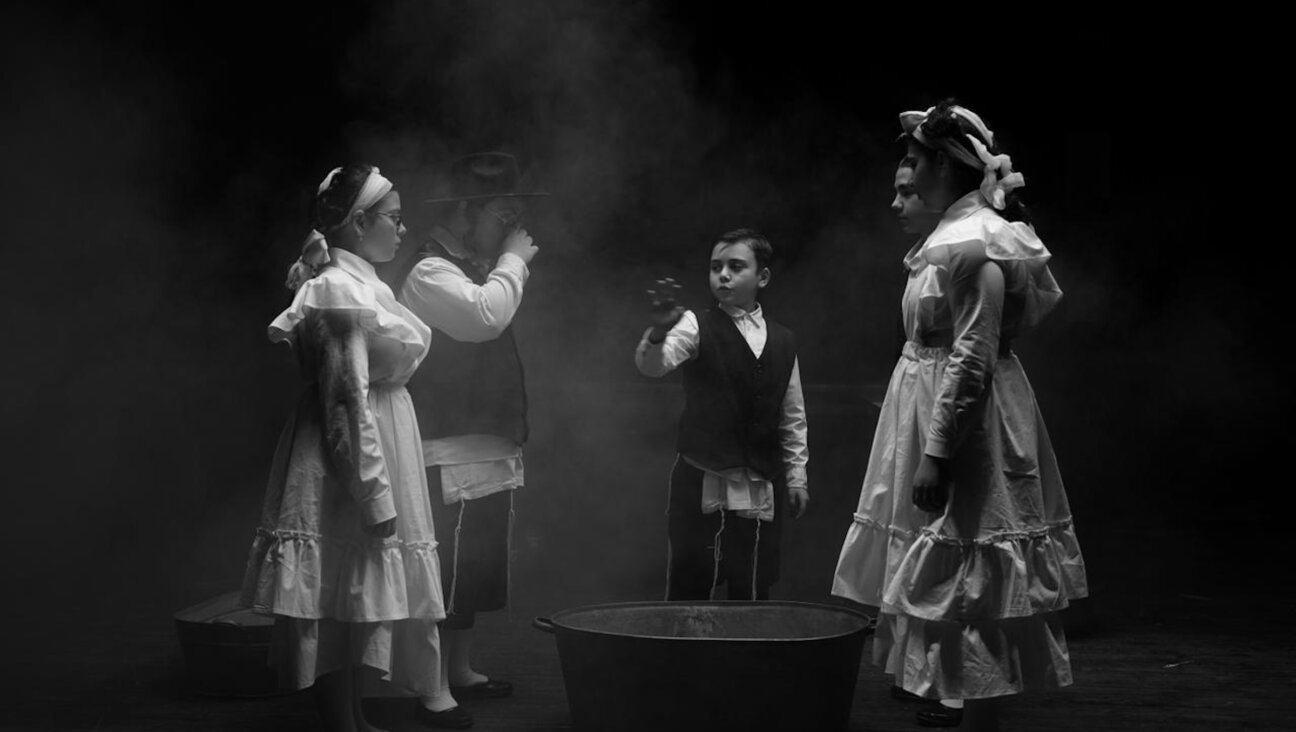“We Shall Overcome” sung in Yiddish

Graphic by Angelie Zaslavsky
Read this article in Yiddish
While the wave of demonstrations sweeping the world in the wake of George Floyd’s murder will undoubtedly inspire a new generation of protest music, it has also led many to revisit older songs. Some feel that the anthem most associated with the Civil Rights Movement, “We Shall Overcome,” is too passive for our moment. Others see in it a source of strength. Bernice King, daughter of Martin Luther King Jr., for instance, wrote on Facebook last month that the song’s refrain is neither passive nor naïve but a “conscious commitment to courageous work.”
That “commitment to courage” is, doubly present, I feel, in its recent Yiddish adaptation, which combines the original with lyrics spontaneously created during a mass execution in the opening days of the Holocaust.
In the fall of 1939 Nazi officers rounded up a group of Hasidic men in Lublin and ordered them at gunpoint to sing. The group began singing the Yiddish folksong “Lomir Zikh Iberbetn” (Let’s Make Up), but soon one man changed the words to “Mir veln zey iberlebn, avinu shebashaymim” (We will outlive them, our father in heaven!). What started as an individual’s small act of resistance spread, and soon dozens of men took up the song. Even when the Germans attacked them with whips and clubs the song still resounded until a volley of gunfire was heard.
This act of spiritual resistance was not particularly well known until activist Jenny Romaine adopted the words “mir veln zey iberlebn” as a slogan for political protests in New York in the wake of President Trump’s election. The Klezmer group “Tsibele” subsequently popularized it as a song.
Two summers ago, at the Jewish Culture Festival in Krakow, Yiddish folksinger Michael Alpert, alongside trumpet player and composer Frank London, clarinetist David Krakuer, and a group of local musicians, performed a stirring trilingual Yiddish, Polish, and English rendition of “We Shall Overcome.” Instead of translating the English words literally, Alpert adapted the refrain those doomed men had sung in Lublin some 78 years earlier as his version’s new Yiddish chorus. The resulting Yiddish song retains the spirit of the original but takes a less passive tone, a “commitment to courage” as Beatrice King put it, that is more directly stated than in the original.
The lyrics translate to:
We’re going to outlive them
We’re going to outlive them
We shall fight together till the end
I feel in my heart that there will be justice in my country
Let’s fight till the end.
While the recent translation of “We Shall Overcome” is a moving addition to the Yiddish protest cannon, it is not the only Yiddish song associated with the American Civil Rights movement. In 1965 folksinger and Broadway star Theodore Bikel performed for Martin Luther King and several hundred demonstrators in Selma, Alabama. The song he chose to sing for them was the Yiddish worker’s anthem “Un Du Akerst” (And You Plow). Although written by the Yiddishist political theorist and philosopher Chaim Zhitlovsky, it has a much longer history of transcultural adaptation. It was closely based on a poem by the German revolutionary Georges Herwegh, which was in turn based on a poem by Percy Shelley. According to Bikel, the song, performed bilingually, was a hit with King and his fellow marchers.

















